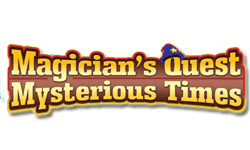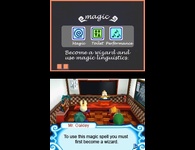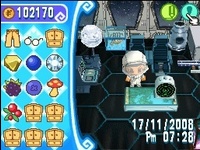|
|

|
PLATFORM
|
DS
|
BATTLE SYSTEM
|

|
INTERACTION
|

|
ORIGINALITY
|

|
STORY
|

|
MUSIC & SOUND
|

|
VISUALS
|

|
CHALLENGE
|
Easy
|
COMPLETION TIME
|
40-60 Hours
|
|
OVERALL

|
+ A comfortable game for the casual players
+ Whimsical character design
+ Interesting use of time mechanics
- Lack of depth
- Cleaning the classroom after turning the power off without saving
|
Click here for scoring definitions
|
|
|
Many of the standard RPGamer score criteria are unable to fall neatly into focus with Magician's Quest: Magical Times -- previously known as Little Magician's Magic Adventure, Enchanted Folk and the School of Wizardry in Europe, and 365 Days of Pointy Hats and Magic in Japan.) There is only one enemy to fight in the entire game, unless one is to count casting flatulence spells to dispel ghosts in the village's haunted house. Moreover, Magician's Quest has little story of which to speak. Without a linear story to experience, there is no true ending either. Whenever players no longer want to visit their school, it's over. There are missions, but they're handled in a “whenever you want to get around to it" kind of way. The game is (here it comes) Animal Crossing with wizards. You hunt for bugs and fish to feed befanged reference books, woo magical robots, and make money to supplement your furnishings and wardrobe. It's a fun diversion, but lacks the depth or other addictive qualities that would provide staying power.
At its core, Magician's Quest is a sandbox game. The silent, player-designed protagonist enrolls at a school for oddly shaped wizards and is let loose to explore. In addition to hunting, fishing, and berry-hunting, Magician's Quest contains systems for gardening, musical performance (including shaky renditions of Pierce the Heavens with Your Drill on the school chimes), relationships, room decoration, and the sale of pirate bones under suspicious circumstances. Classes occur every few days, each one teaching different spells that can be used for such ends as bothering their classmates, causing amusing but functionally useless changes in the environment, and assisting with quests (called mysteries).
Of its many divergences from the prototypical console RPG, Magician's Quest: Magical Times's use of time has the largest influence on creating an uncommon experience. It cannot be played straight through, as most important events are time specific: classes are only taught between certain hours, berries sprout every couple of days, the pirate captain only shows up on Sunday, and trying to find August bugs in June is simply impossible. Although one could easily modify the Nintendo DS's date and time and continue business as usual, it does mean that certain frequent chores such as watering rare flowers and talking to friends so that they do not move away become more tedious. This expanded timeframe suggests that the default way to play is a little at a time, drawing the experience out so that it changes with the seasons.
Playing slowly is an effective strategy for Magician's Quest because in spite of the compulsive moments of collecting and the constant drive to purchase the coolest stuff, life at a magic academy can be pretty boring at times. A lot of the tasks that make big money are interesting the first few cycles, but can turn into a grind when the target is as expensive as a fancy racing broom. The mysteries add texture to the daily routine, but even they are not surefire balms. Although each of the thirty-eight standard mysteries and several seasonal mysteries are different, solving them is often a matter of talking to the right person, trial and error, and waiting. Meeting the star of each mystery is fun, as they're strong personalities with interesting quirks, but the game's engine doesn't give them enough interactive elements to really shine.
 Magic + Toilet + Performance = ?
Magic + Toilet + Performance = ? |
|
Although the world is limited in scope, it's packed with character throughout. This is apparent in the whimsical character design and the tilted architecture, as well as the quirky dialogue. It isn't quite “ha-ha" funny, nor is it “weird" funny, but nevertheless has unmistakable charm. If the desire to talk to clumsy anthropomorphic otters about their taste in hot sauce or e-mail etiquette is one of your secret desires, it will finally find outlet. RPGamers who don't appreciate slice-of-life stories, on the other hand, will just find hanging out with their in-game friends cloying and repetitive. A good example is the punishment for turning the power off without saving. The first few times, a grumpy, persimmon-headed man yells at the player about school pride and responsibility. Subsequent infractions are met with unskippable lectures and classroom-cleaning mini-games where the principal tells you that he is Very. Disappointed. In. You. This ambiguous characterization is supported by the inconsistent localization; sometimes it is quite good, but other moments, such as when listening to rumors, the text hearkens back to the dark days of console gaming.
The graphics are bright and expansive, taking up both screens to display a continuous earth and sky. As a result, buildings tower over the academy's students and seem much larger and more spacious on the inside than they really are. This also draws a greater focus to the sky than is typical from single-screen games. At night the multi-hued sky displays a changing cast of stars and planets, each with in-game astrological influence. Unfortunately, this grandeur is in many ways an illusion. The world's suggestion of being packed with endless exploration is a cruel tease, and the small number of visitable locations quickly become repetitive. Soon the beautiful backgrounds become little more than stages for running into classmates.
 If you're a good enough berry baron, you'll end up rich as astronauts!
If you're a good enough berry baron, you'll end up rich as astronauts! |
|
The background music is pleasant and varied, but there are no standout tracks. It is most noticeable after a visit to the music store equips you with new songs and your own instrument. At that point your character is able to play one channel of the song. Other students who walk by may choose to join in with their chosen instruments, transforming a common street corner maraca solo into a four-piece ensemble, piece by piece. The effect is a pleasant one, and it showcases the sense of community that Magician's Quest shows when it's at its best.
Interface is logical and clean, but slow to perform several common tasks. For example, casting a spell requires first transforming into wizard mode, which requires a circling motion on the d-pad, and then inputting a 3-5 symbol spell from fifteen pages of menus. The spell is then saved in the wand until you leave the screen or try to cast a new spell. While this system is effective in presenting a magic system based on rote memorization and practiced actions, it hinders the easy use of magic and is hardly fun.
As suggested by the Animal Crossing comment at the start of this review, Magician's Quest's concept is far from original. It's cute and I can see certain subsets of gamers becoming addicted to treasure hunting and meeting all of the residents, but there are no new discoveries to be found here. It is the reliable standard meant for filling in sleepless nights and frequent commutes, not revolutionizing the sandbox.
Review Archives
|









